Jan 03, 2025 – Day 11 of Bhutan Survey_Visiting Wamling, Thrisa, Radi, and Nimshong Chiwogs
Hello. It’s the 11th day of the Bhutan survey. Today, Sunim visited Wamling, Thrisa, Radi, and Nimshong chiwogs in Shingkhar gewog and had conversations with the residents.
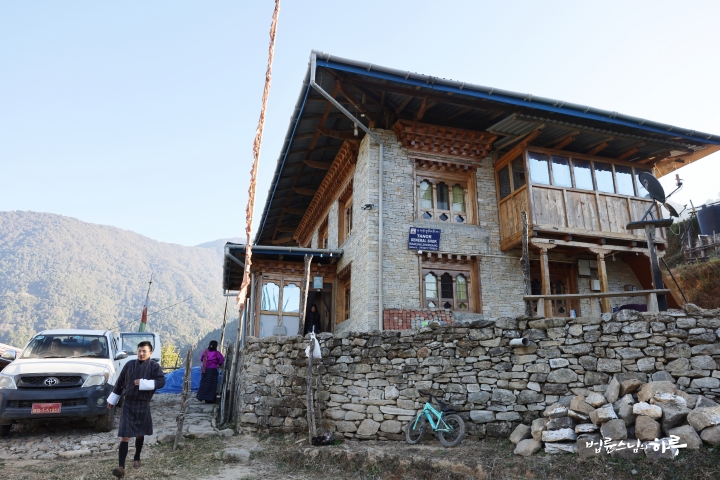
Sunim began his day with practice and meditation in the early morning, then communicated with Korea and handled various tasks. At 7:30 AM, he had breakfast prepared by the guesthouse and briefly chatted with the host before departing for the survey.
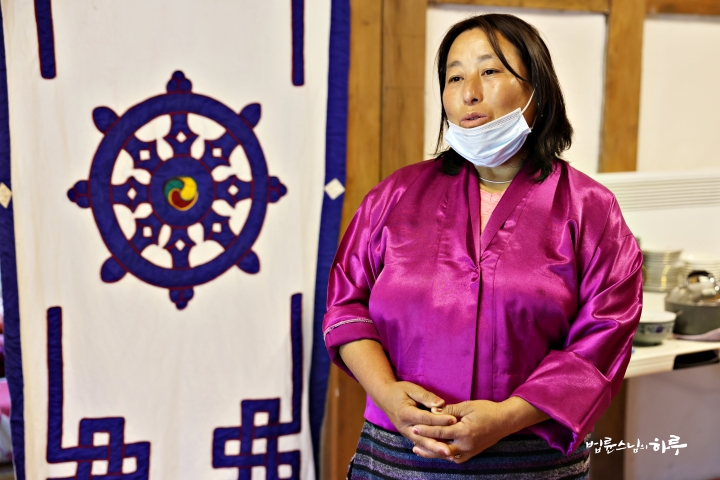
“The people of Wamling seem to be doing a bit better. When I went to Zhobkha gewog recently, it’s in the same Zhemgang area, but their situation looked much more difficult.”
“Yes, while Wamling chiwog isn’t very well-off, it’s in a slightly better situation compared to other chiwogs.”
Sunim asked a few questions about the difficulties in the Wamling area and the residents’ lives, sharing opinions. When it was time to leave, Sunim thanked the host.
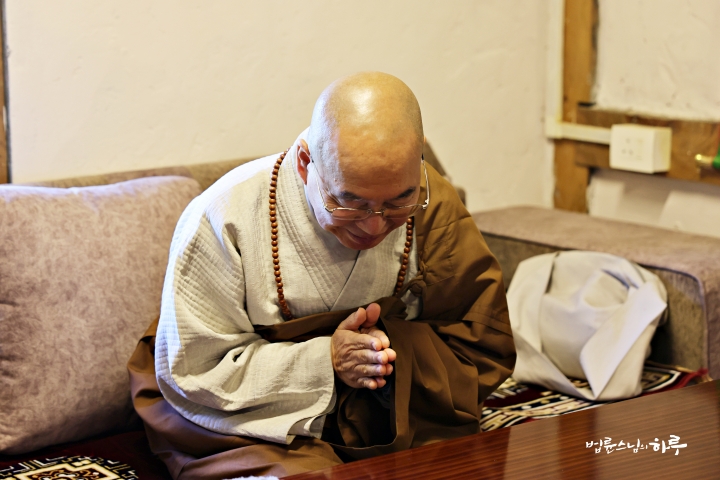
“Thank you for preparing the meals and accommodation. We ate well and rested well.”
“Thank you for visiting.”
After leaving the guesthouse, he moved to the Wamling kindergarten. This was where he was scheduled to have conversations with the villagers.
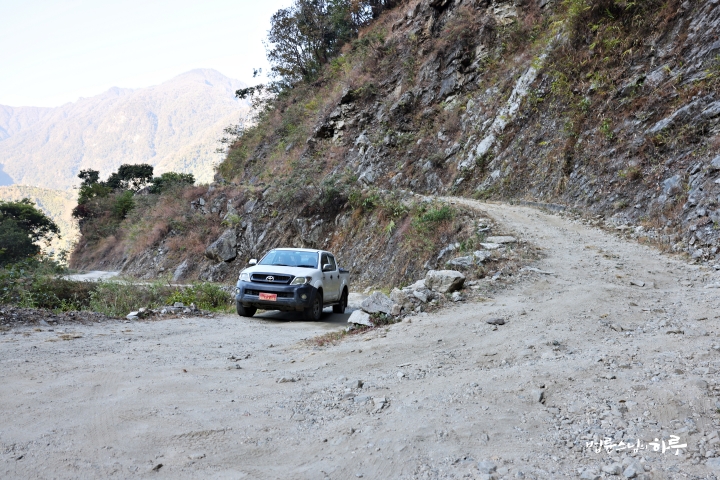
Having arrived earlier than the appointed time, there weren’t many people gathered at the kindergarten. The Tshogpa checked and found that the residents were just starting to arrive. Sunim looked around the terraced fields behind the kindergarten until it was time to meet with the residents.
“This place also needs irrigation repairs. But it won’t be easy to carry cement all the way here.”
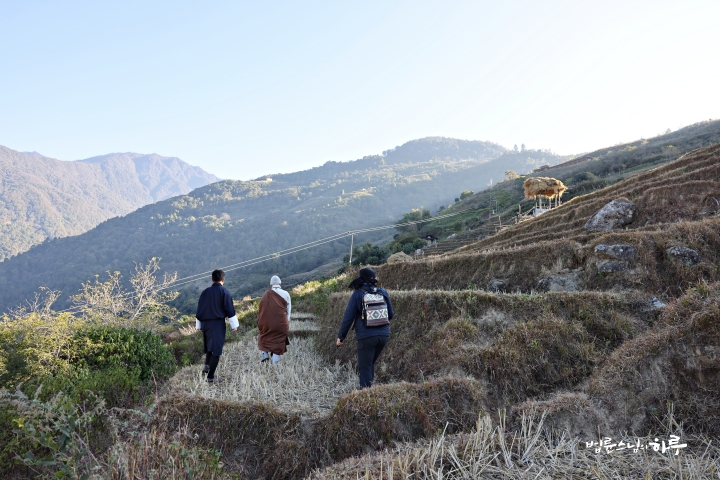
While inspecting the irrigation channels of the fields and walking, he saw residents coming from afar.
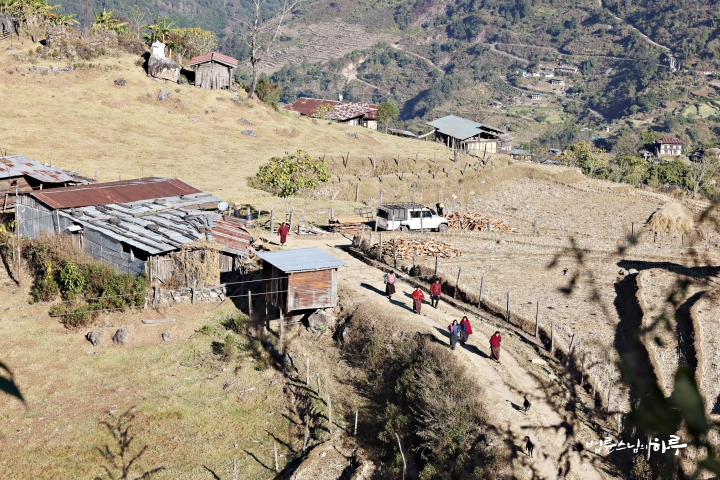
Around 9 AM, when all the villagers had gathered, a brief traditional Bhutanese welcome ceremony was held, and the conversation began in earnest. Sunim first greeted the residents.
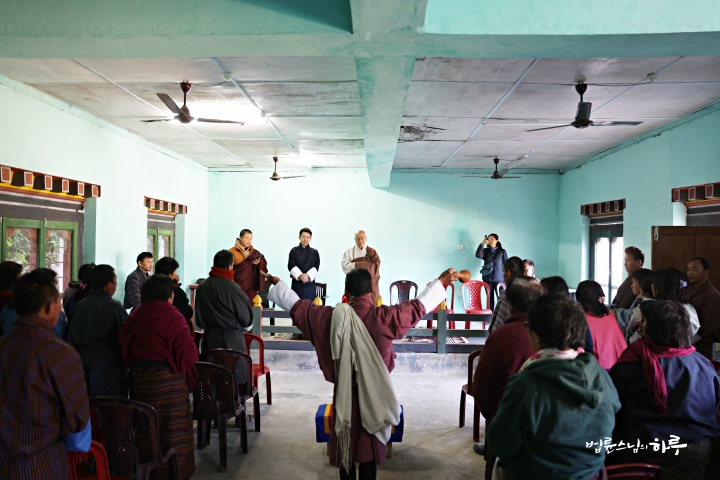
“Everyone, it’s nice to meet you. I come from Korea, which is even further east than China.”
After hearing an explanation about the village’s current situation from the Tshogpa, Sunim began the conversation by explaining about the JTS project.
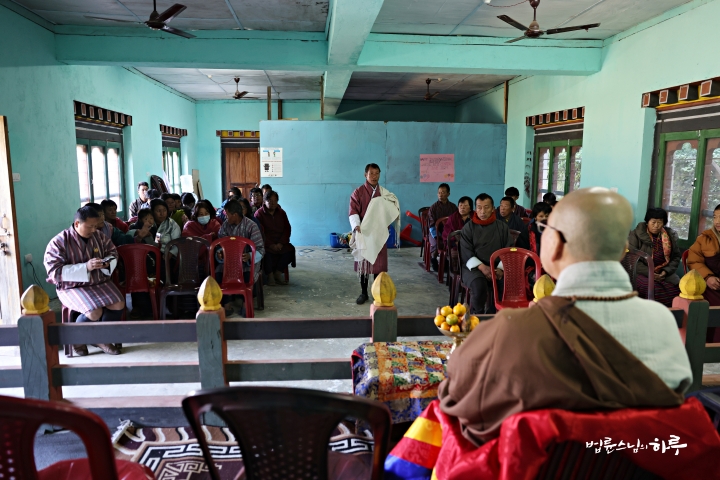
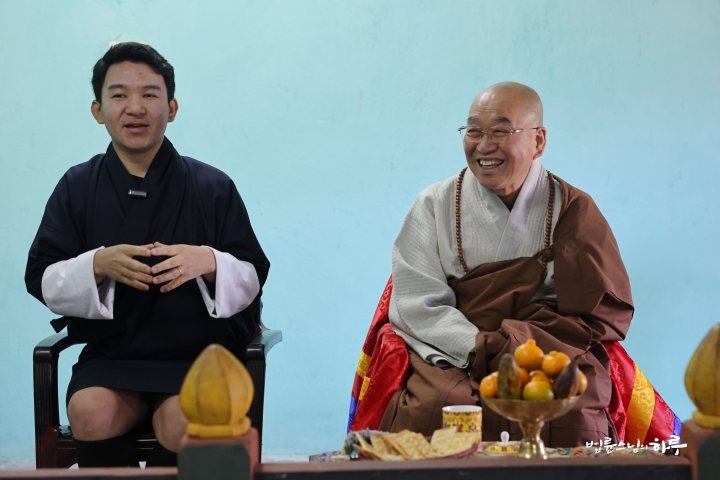
“The JTS project involves improving houses, building fences, repairing irrigation and water supply systems to make villages better places to live. But I’ve heard that everyone in Wamling is doing well. So I was told there’s not much to help here. (Laughs)
If there’s nothing to help with, that’s actually a good thing. However, if you want to improve your living environment by building partitions in houses, making shelves, or fixing kitchen facilities, we can support that. The Tshogpa mentioned that the water source is insufficient, but are there any other special problems?”
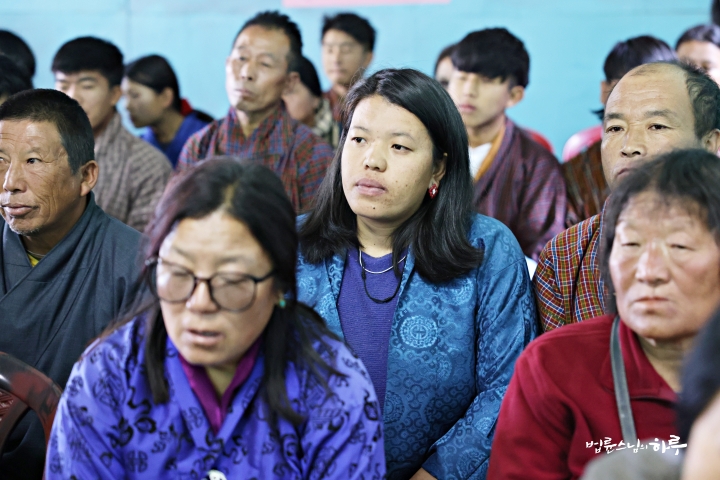
A resident responded to this.
“We need to reinforce the irrigation channels. We asked the government, but they said there was no budget, so we’ve been repairing them little by little. However, landslides occur every year, and the repaired irrigation channels often break down. If you could just provide the materials, we think we could repair them properly.”
Sunim then shared the case of Nabji village in Trongsa.
“Do you know Nabji village in Trongsa?”
“Yes, we do.”
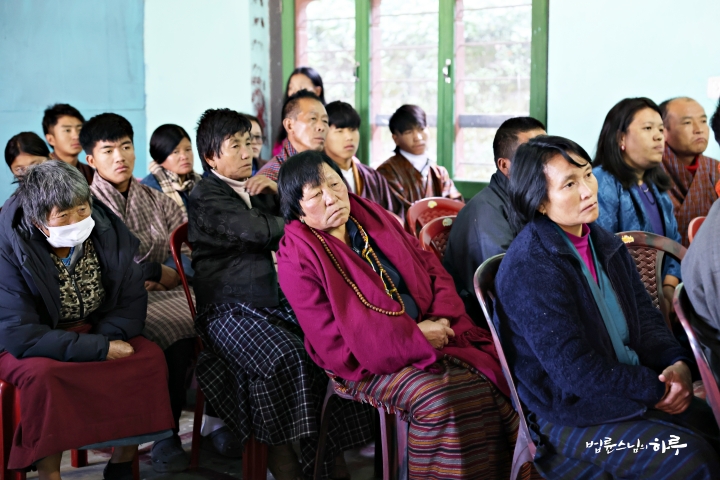
“The residents of Nabji, like you, wanted to repair their irrigation channels and work with cement where needed. They built 350 meters last June, took a break during the busy summer farming season, and are now continuing the work. As you know, to repair irrigation channels, you have to carry cement and materials up to the channels. Can you do this? Khomsar and Bardo chiwogs also said they would do it, so we’re preparing now, but these days, people don’t like to do hard work, right?”
The residents responded to this.
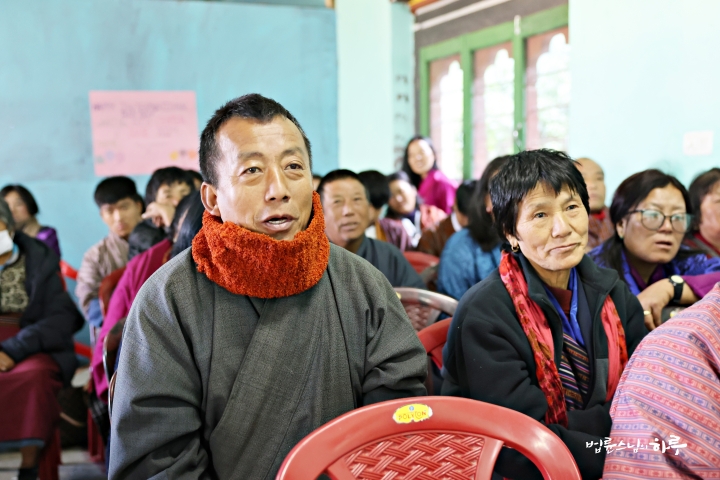
“In Wamling, our main agriculture is rice farming, so it’s difficult to farm without water. If you provide the materials, we will do the construction.”
“However, when we gather to talk like this, everyone says they’ll do it, but when the work actually starts, people often don’t show up for communal labor, causing difficulties. So this issue depends on whether all the current residents can participate. Especially for the irrigation work, many men need to step up.”
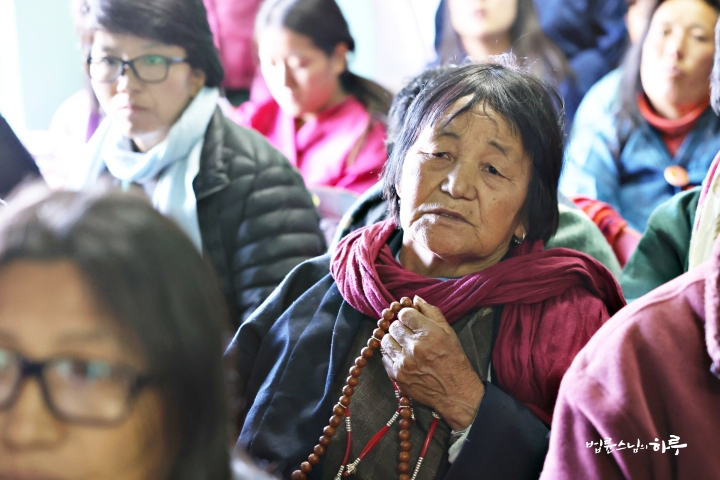
There were differing opinions among the villagers as well. Sunim explained the support principles once again.
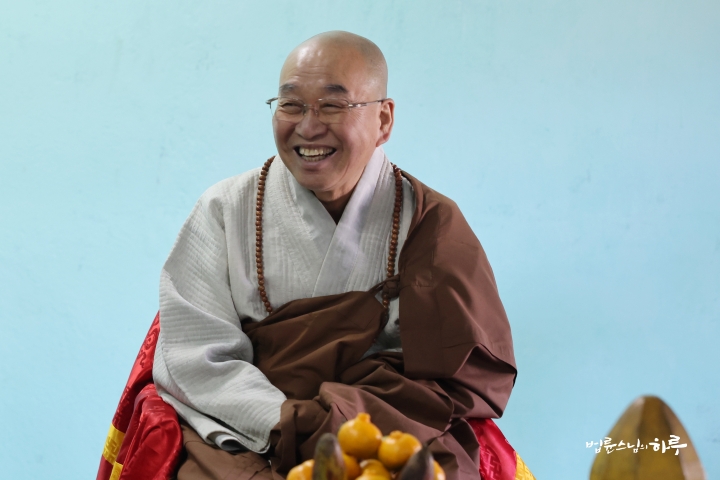
“In the past, Bhutanese people actively participated in community work, but these days, as government support has improved, there seems to be a tendency to avoid communal tasks. However, this project will only provide support if you request it because you need it. Struggling regions are willing to do anything, but more well-off areas are often hesitant to step forward. I think Wamling might be challenging because it’s relatively well-off. (laughs)
You need to make a decision. If you want the government to do it, you’ll have to wait. It could take 1 year or 5 years, we don’t know. But if you say you’ll repair the irrigation canal yourselves because it’s necessary for our farming, we’ll support you. However, the Tshogpa alone can’t be responsible for everything. If we bring the materials but there’s no one to work, we’ll end up wasting all those materials.”
Even after this, villagers’ opinions were divided between “we can do it ourselves” and “we can’t,” but Sunim promised to support what was needed and concluded the conversation.
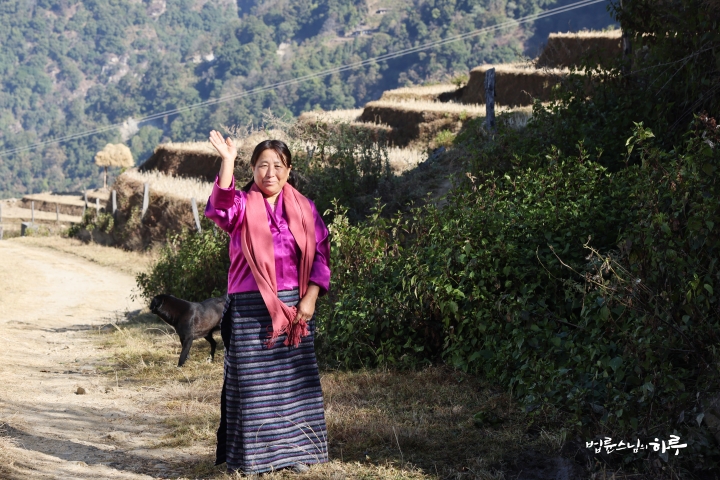
At 10 o’clock, we departed for the next survey site, Tsherisa Chiwog. After about an hour’s drive, we arrived at Tsherisa Temple at 11 AM. As vehicles couldn’t reach the temple entrance, we parked below and walked up.
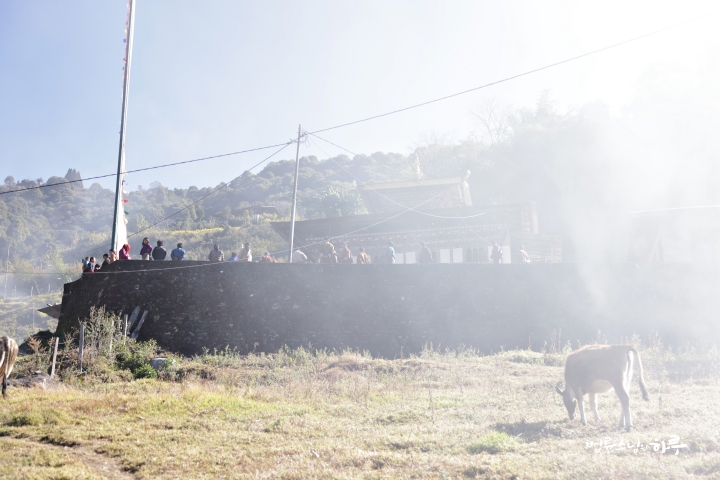
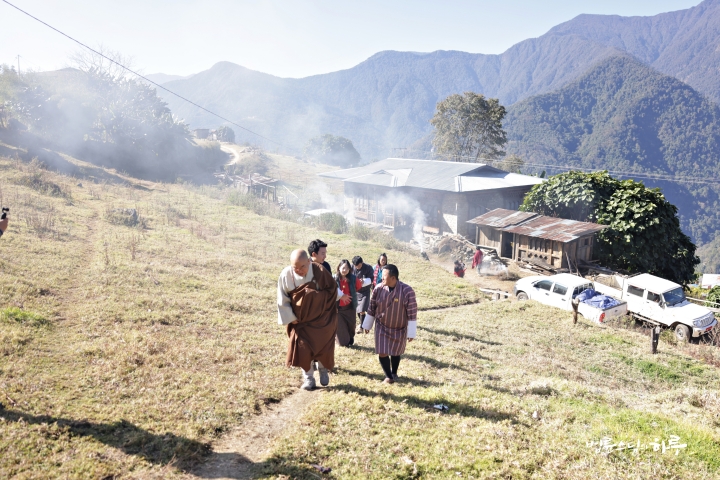
On the way to the temple, the fences around each house were quite well-maintained.
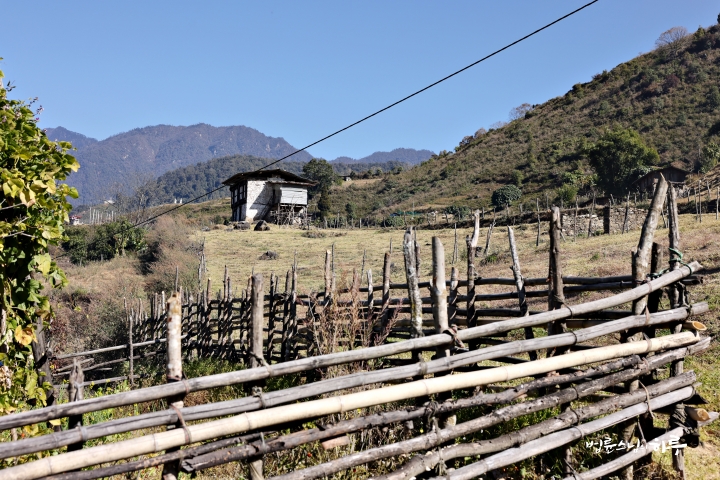
“Wow, this place has the best fences among all the villages we’ve visited so far.”
“Yes, last year, as part of a government support project, they installed fences extending about 10km. Overall, and for individual households, the fencing is quite good.”
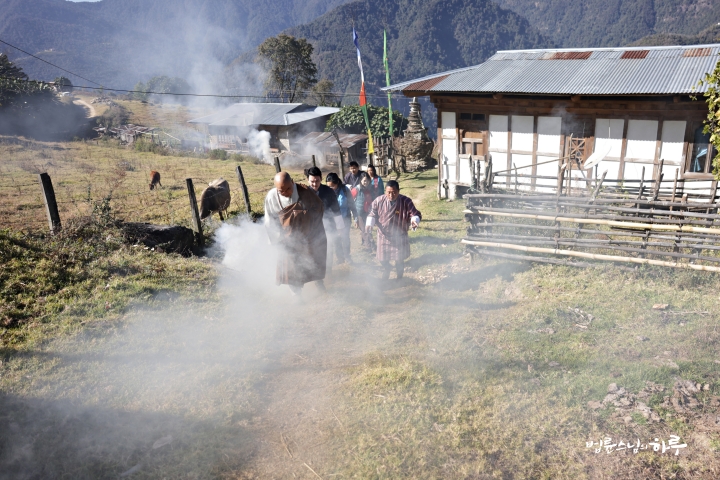
Villagers were waiting for Sunim at the temple entrance. After entering the main hall and paying respects, a simple traditional welcome ceremony was held.
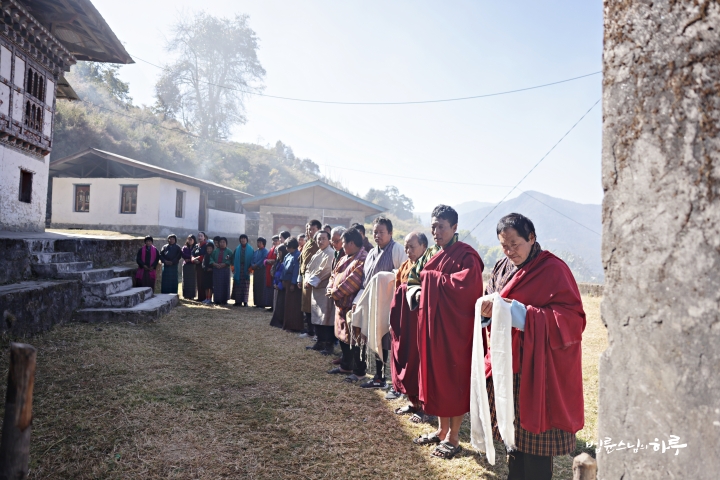
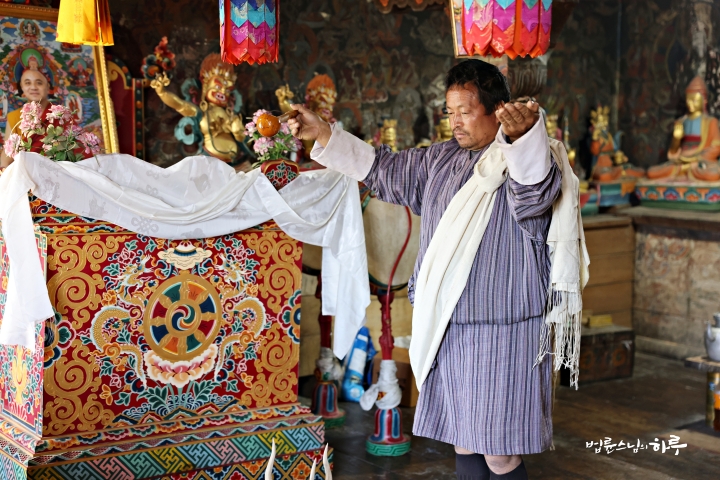
We had planned to talk with the residents in the main hall, but due to limited space inside, we moved to the backyard of the temple. Under the warm sunlight, Sunim began conversing with the villagers. He first listened to the difficulties they were facing.
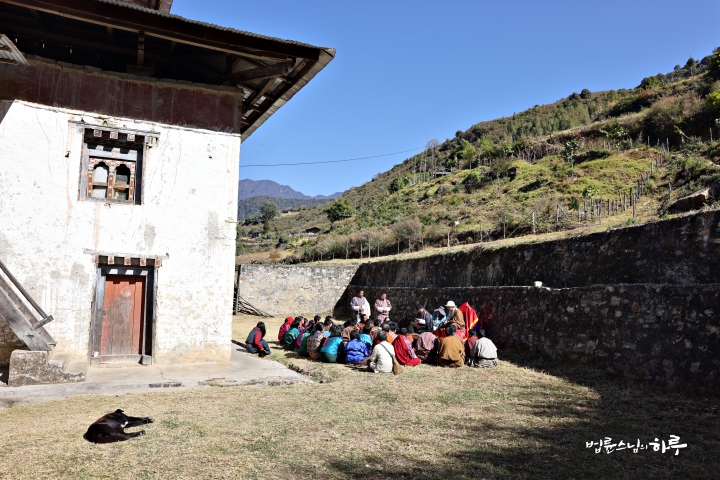
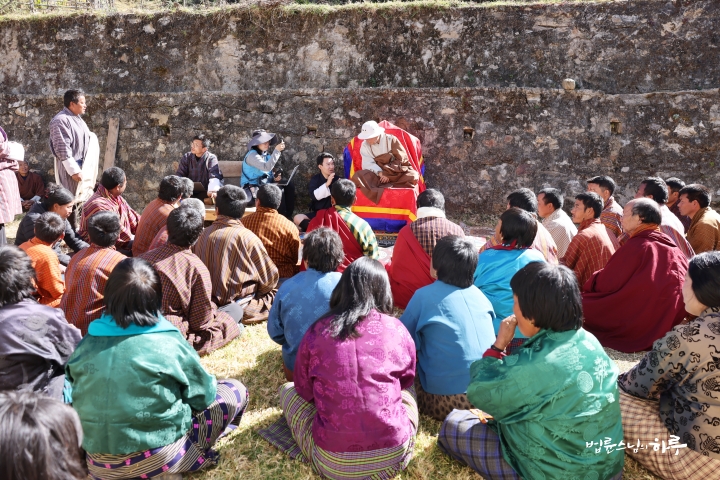
“There are 5 people without homes.”
“We have a cardamom farm, but there’s a water shortage. The water source is 3.5km away.”
“There’s a shortage of drinking water.”
“In the village, we have a child with a head injury, a child with leg problems, and a resident with disability after being injured by a bear. We need support for them.”
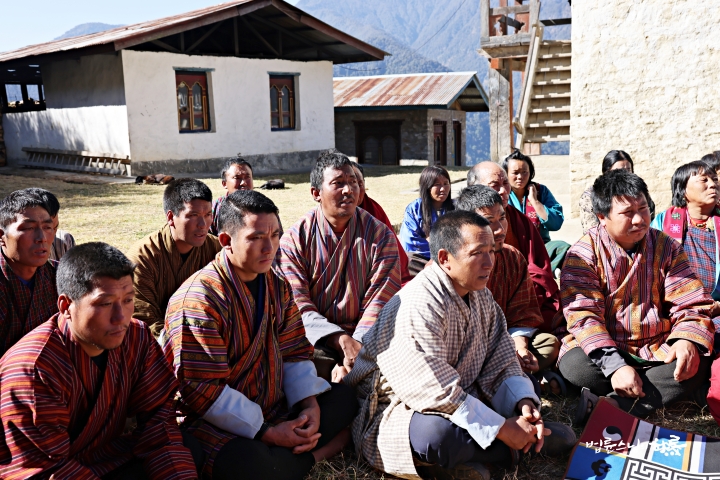
For about an hour, Sunim carefully examined various issues while talking with the Tsherisa residents. He asked detailed questions about their living and housing conditions, such as whether the village could build houses for those without homes if materials were provided, how many households lived near the cardamom farm, if they could do the water works themselves if materials were provided, whether rooms had partitions, how they lit fires, and what condition their kitchens were in.
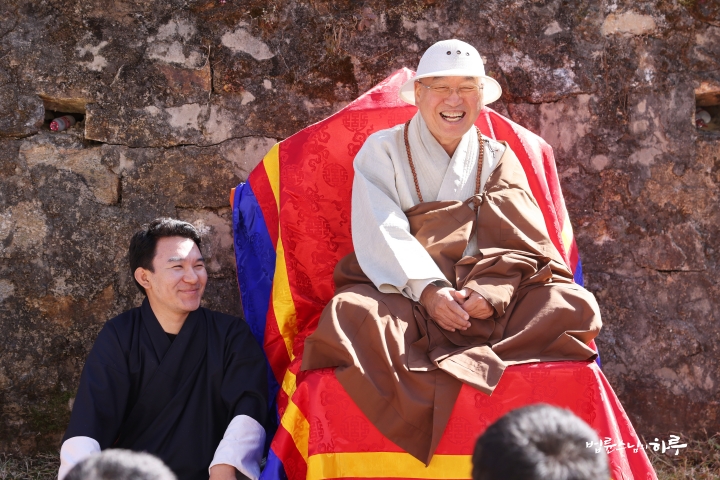
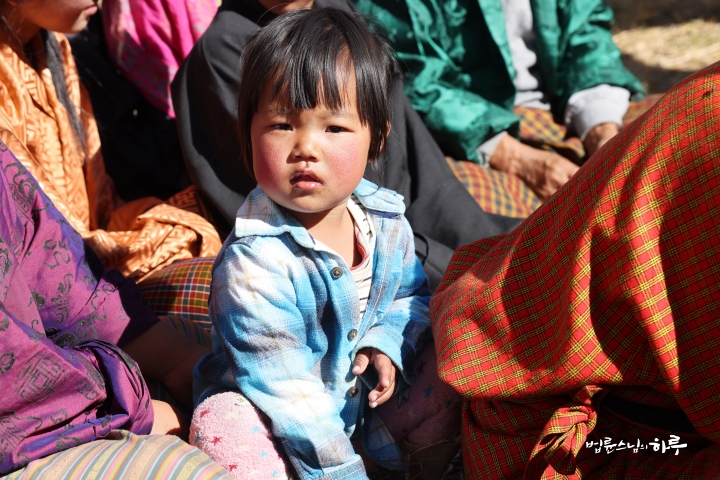
As Sunim asked thorough questions and suggested improvements, the villagers began to open up. The initially tense atmosphere relaxed, and their willingness to improve their living conditions became apparent. After the conversation, the villagers brought a carefully prepared gift for Sunim. It was a basket of dried chili peppers, a gift filled with the sincerity of the villagers who had grown and dried them themselves.
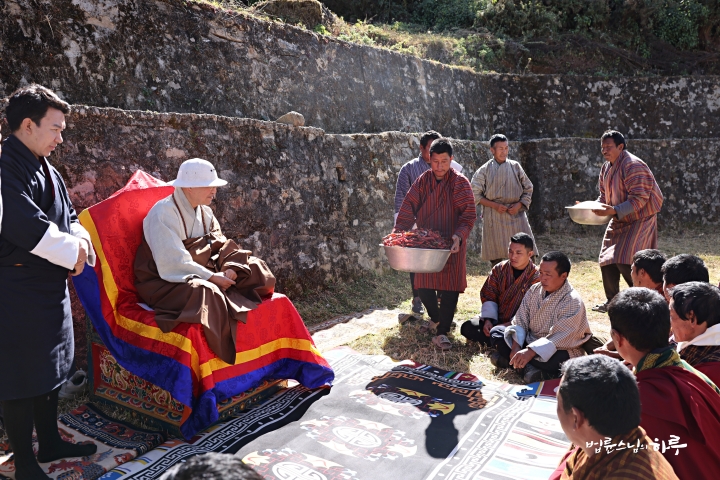
“Everyone, thank you for the gift. I’ll accept it and give it back to you. I hope all the villagers will share this gift equally. And I’ll also make an offering. Tshogpa, please use this for the village.”
Sunim expressed his gratitude by giving an offering to the Tshogpa.
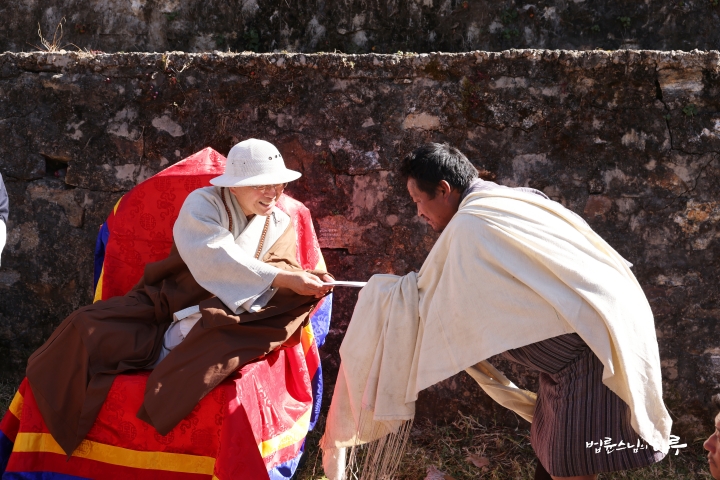
After having lunch prepared by the villagers, we left the temple to move to the next survey site, Ladi village.
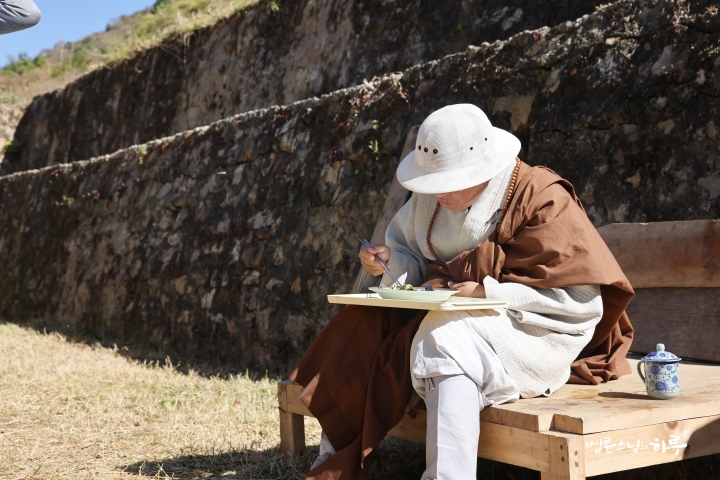
As we were about to leave the temple, a child was looking at Sunim. Judging from the unfocused eyes and unkempt appearance, it seemed to be the child with disabilities that the Tshogpa had mentioned. Sunim approached the child, gently placed his hand on the child’s head, and gave a blessing. Sunim told the staff member responsible for the Bhutan project that educational facilities for children with disabilities might be necessary and that they should develop plans for this in the future.
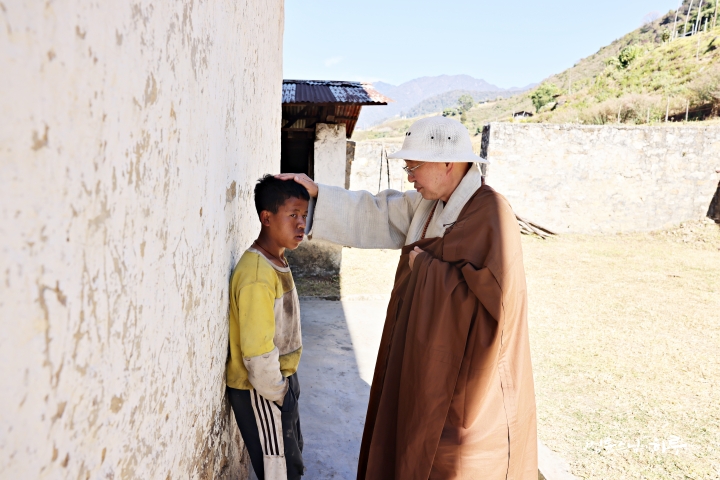
After another hour’s drive, we arrived at Ladi Chiwog at 1:40 PM.
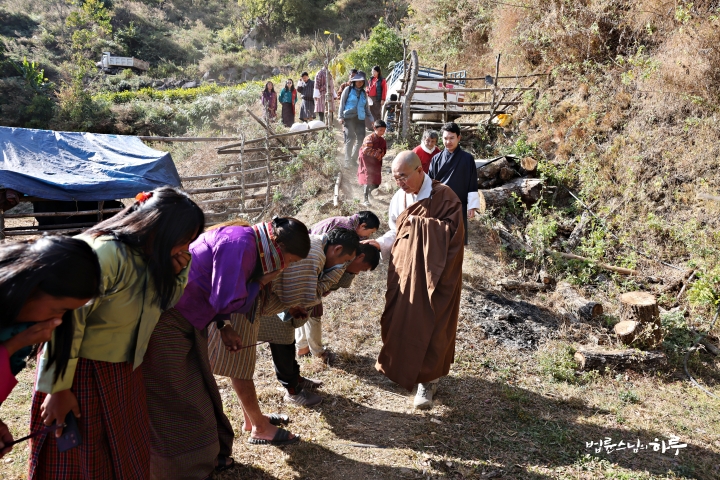
Here, villagers had gathered at the Tshogpa’s house. The Tshogpa’s house was small and modest but neatly arranged to welcome guests. In the elongated space, there was also a small shrine. Sunim paid respects at the shrine and then began talking with the residents.
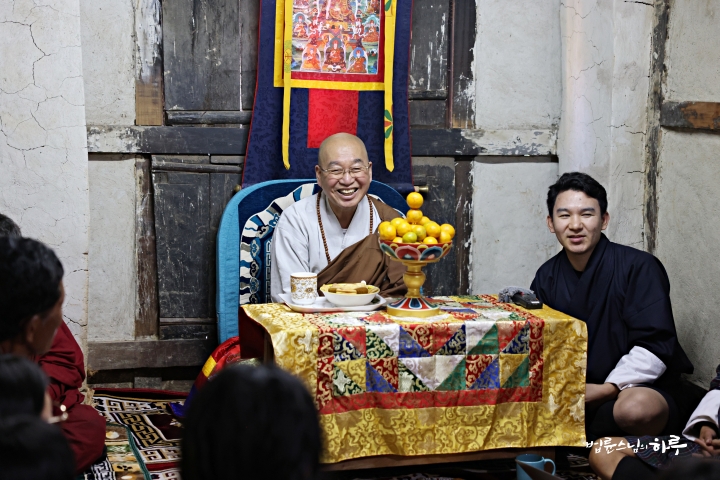
Sunim greeted the residents and explained about the JTS project. He then asked various questions about their living conditions. He inquired whether they still cooked by making fire at home, if their houses had partitions, if everyone had toilets, if their kitchens had countertops, and if they had shelves in their homes, carefully examining all aspects of the villagers’ lives.
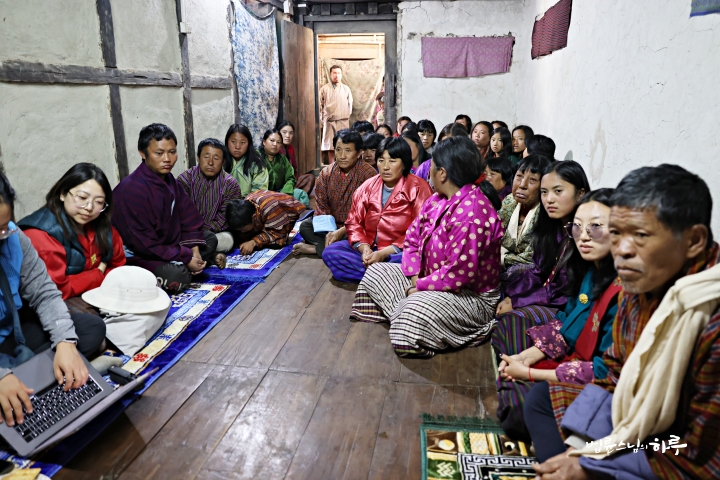
He also checked if there were any people with disabilities in the village. As the conversation continued, the people of Ladi village became increasingly animated.
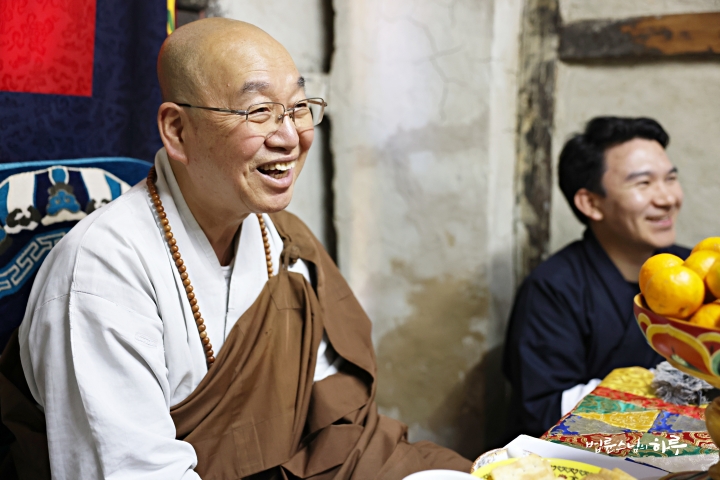
“Let’s try to improve our village ourselves for about 3 years. Everyone, can you do it?”
“Yes, if you provide the materials, we’ll do it! We’ll improve our village ourselves!”
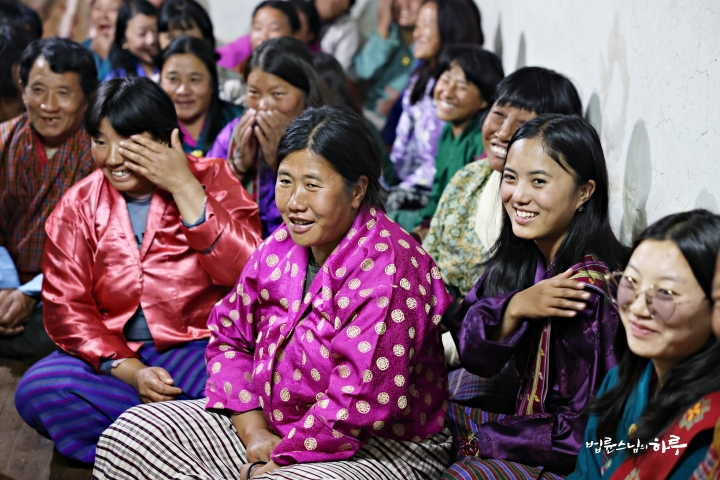
The villagers answered loudly, strengthening their resolve. After finishing the conversation, Sunim departed for the last survey site, Nimshong Chiwog, with the Ladi villagers seeing him off. After about an hour’s drive, we arrived at Nimshong Elementary School at 3:45 PM.
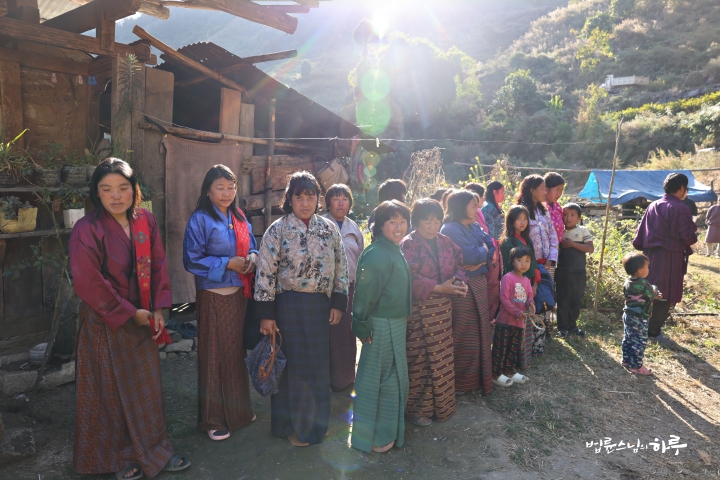
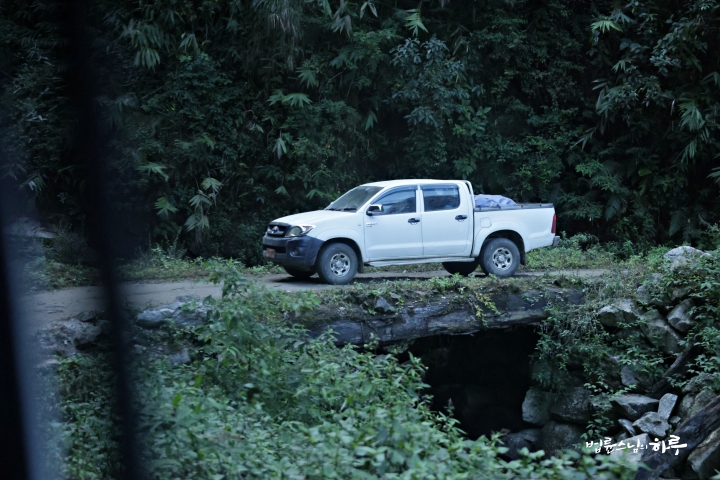
Villagers were waiting for Sunim on the school playground. After receiving a welcome from the residents, we moved to the school auditorium to start the conversation.
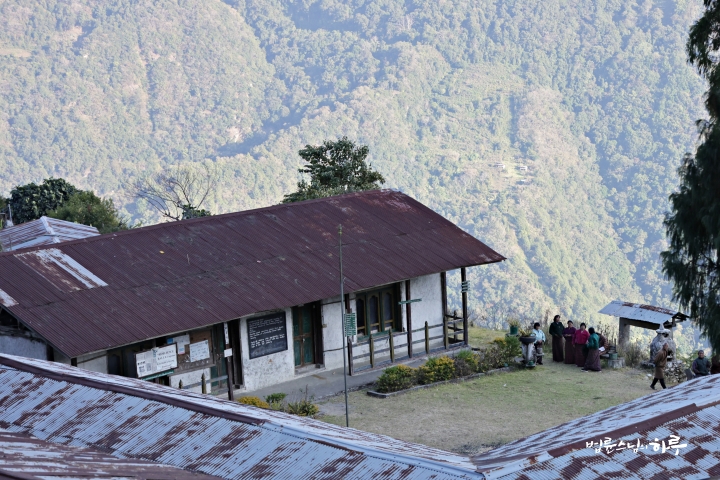
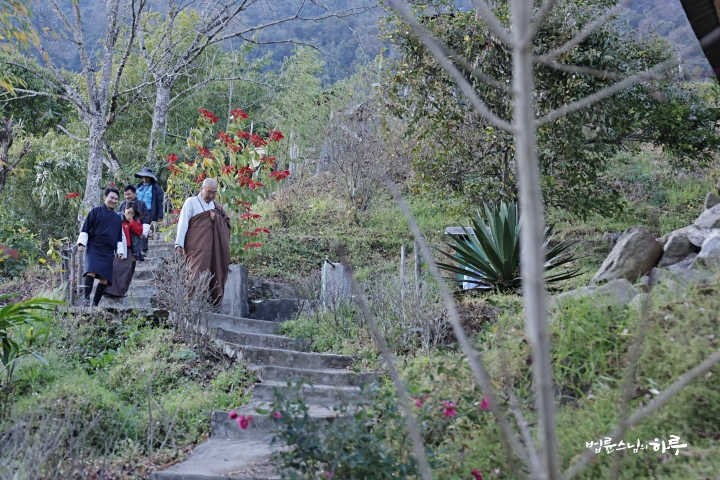
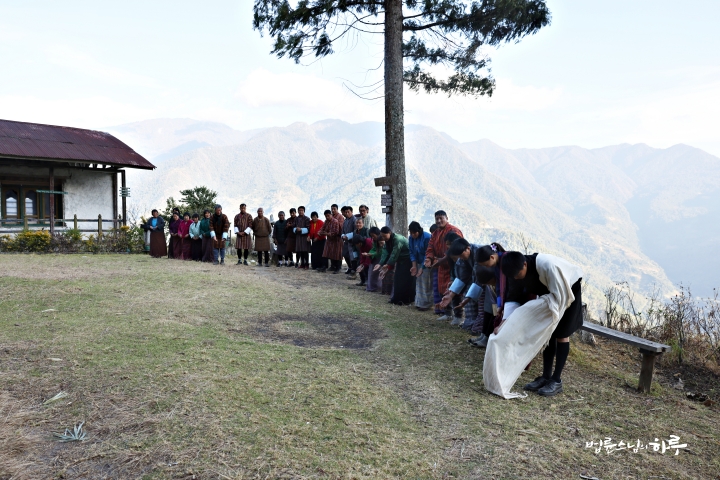
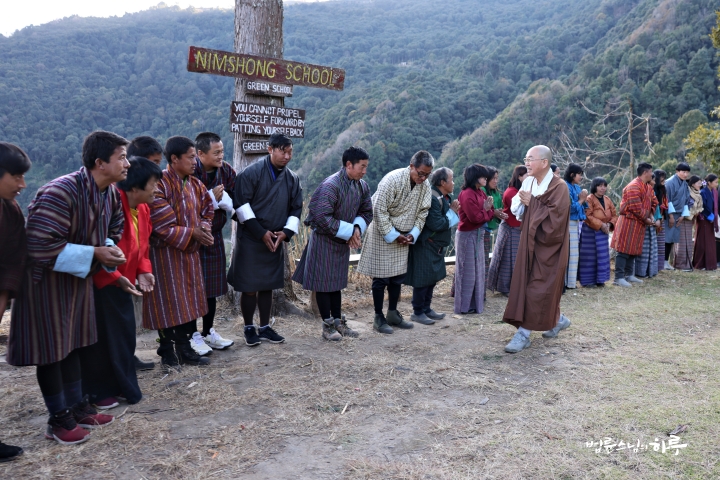
First, the Tshogpa of Nimshong village explained the current situation of the village.
“There’s a shortage of drinking water in the village, and the old irrigation canal needs repair. There are households without homes, and the overall living environment of the village needs improvement.”
Then Sunim gave his greeting.
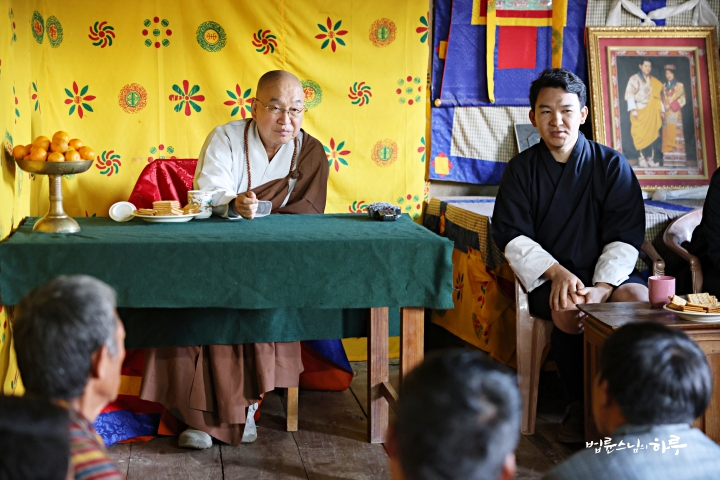
“Hello. I come from Korea, far to the east. To get here, I can’t come directly but have to transit through Bangkok or Delhi. The fact that I’ve come from such a distant place to Bhutan, and even to Nimshong, to meet you all means we have a very deep connection.”
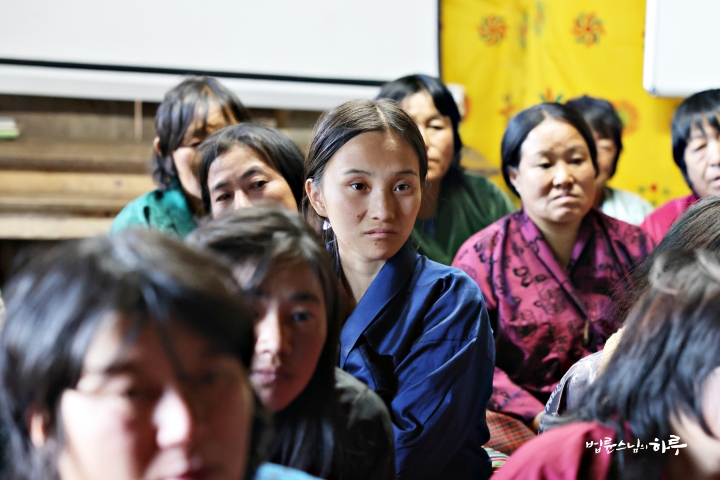
Sunim explained how he came to Bhutan, the purpose of the JTS project, and what kind of support could be provided, one by one. Even though this was the fourth survey of the day, Sunim spoke as calmly and carefully as if it were the first time.
“I’m currently visiting all 40 chiwogs in Zhemgang Dzongkhag. I’ve even slept in villagers’ homes. Some houses were very cold. Even though I was wearing thicker clothes than you, I felt cold. But if we light a fire inside the house, it’s difficult because of the smoke. We want to change these inconveniences together. Also, people need water to live, right? JTS will provide cement and pipes, so the villagers can work together to improve the water supply. Do you want to wait for the government to do these things, or do you want to do them yourselves?”
A villager answered.
“If you provide the materials, we can do it ourselves, Sunim.”
Sunim smiled and said:
“What’s the use if only the Tshogpa answers? If the villagers just receive the materials and nobody works while they stay quiet, how can the Tshogpa manage alone? (laughs)”
The villagers, who were initially shy and quiet, gradually spoke up with confidence.
“We can do it!”
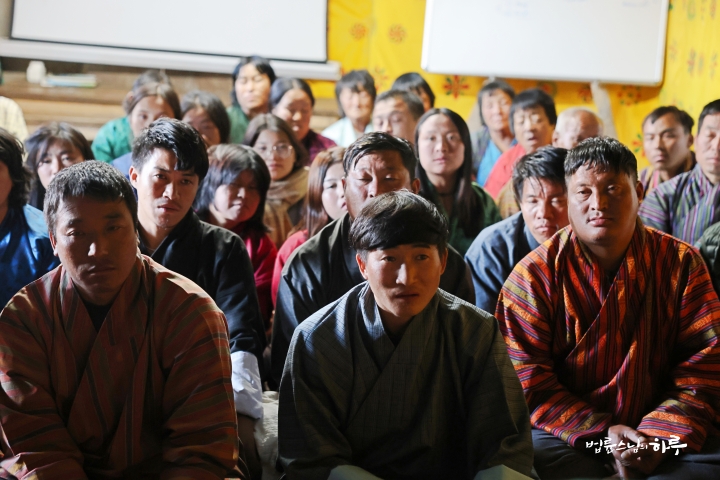
Sunim encouraged them by sharing the example of the Rebati village residents.
“Everyone, do you know Rebati Chiwog?”
“Yes.”
“The Rebati residents also had a water shortage. They found a new water source, but it was 7km away. Still, the residents said, ‘This water is for our children to use in the future too,’ and insisted on doing it no matter what. So we supported them with pipes and cement. The women dug the ground, and the men carried pipes up the mountain. When they had to cross rivers, they tied the pipes with wire to continue the work. In the end, they installed water taps in every house in the village within two months.
At the completion ceremony, I said this: ‘I doubted whether you could do it, and you doubted whether I would support you, but now we trust each other. From now on, I will support whatever the Rebati residents do.’
When I asked the villagers how many days they worked, they said they worked for 29 days each. That’s how much the villagers cooperated to achieve this.”
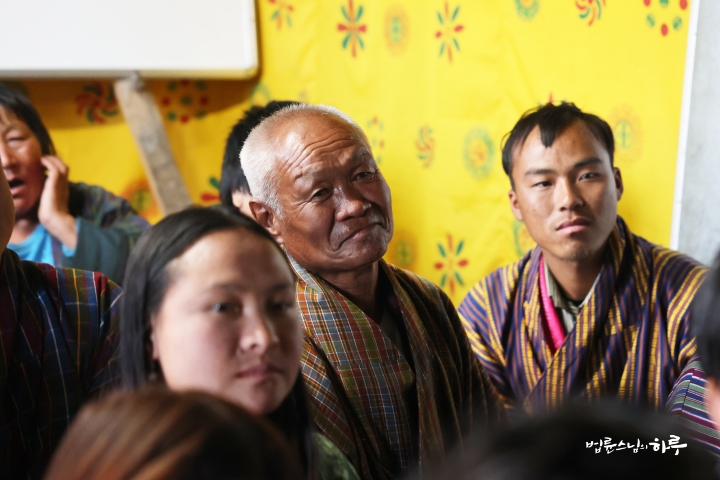
Sunim asked the residents:
“Can you do it too?”
“Yes, we can do it too!”
“If you’re willing to do it yourselves, JTS will support you. If you have the will to improve your lives, we’ll provide technical knowledge when needed and tools when required. Wouldn’t it be great if we could improve our living environment on our own like this?”
“Yes, that would be great!”
The residents of Nimsong responded enthusiastically.
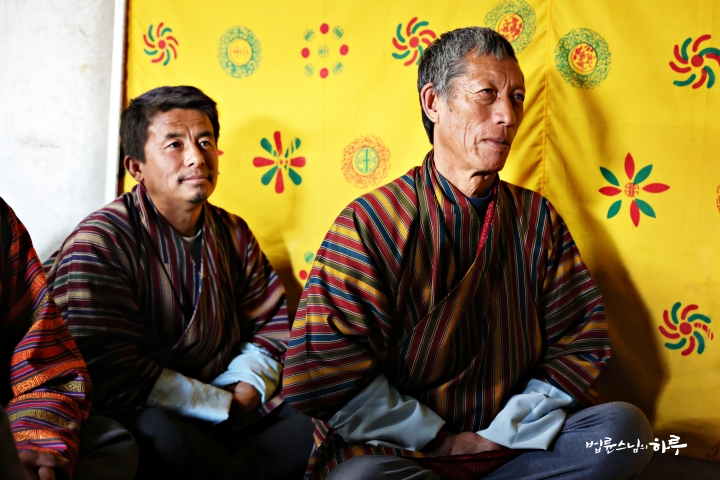
Sunim concluded the conversation and said goodbye to the residents.
“Alright, let’s wrap it up here.”
After finishing the conversation, Sunim bid farewell to Singkal Gewog Mangmi, who had accompanied him on the survey of four chiwogs throughout the day, and moved on to Nangkha Gewog.
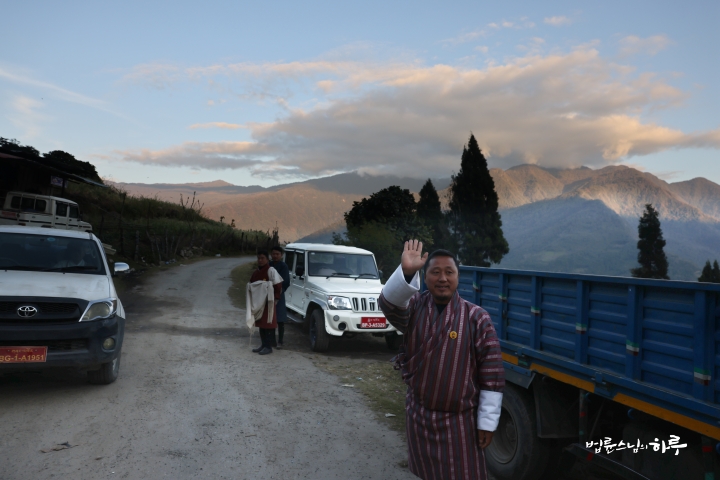
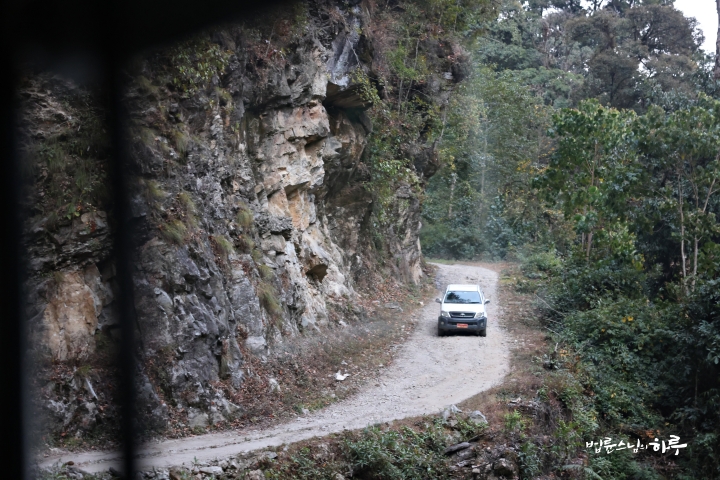
At 6:40 PM, Sunim arrived at the lodging in Nangkha Gewog. The sun had set, and it was already dark.
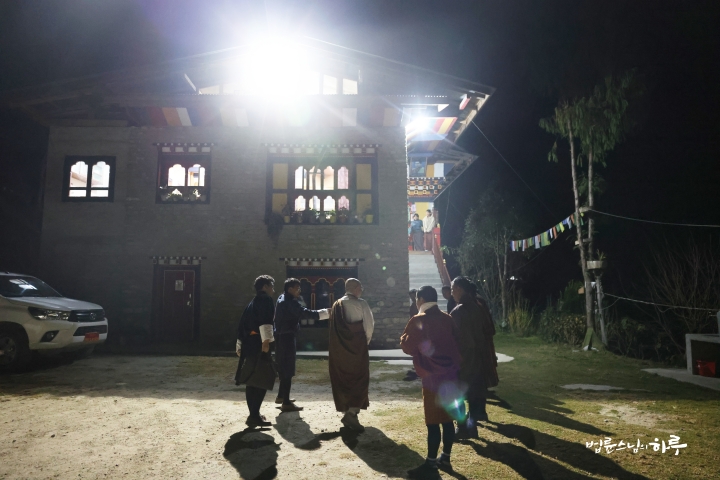
After unpacking at the lodging, Sunim had dinner with his companions and discussed the villages they had surveyed today.
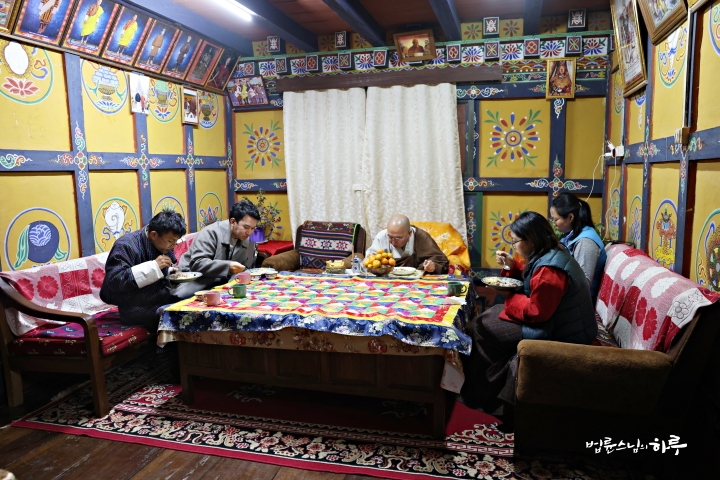
After dinner, he proofread manuscripts and concluded the day. Tomorrow, he plans to survey Nyakar-Cheldang, Kamzhing, and Dengmang Chiwogs in Nangkol Gewog.
Since there was no Dharma talk today, we’ll introduce the content from the Happiness Dialogue Q&A session held in Pohang on November 25th.
I Feel Anxious Because My Promotion at Work Keeps Getting Delayed
“Wanting to earn a lot of money or get promoted is not considered greed. It becomes greed when you suffer because you didn’t get promoted despite your efforts. What should you do if you tried hard to get into Seoul National University but failed? You can try again, and if you fail again, you can try once more.
If one way doesn’t work, try another way, and if that doesn’t work, try something else. If it still doesn’t work out, you can give up. If you’re just suffering without doing this, that’s greed. To achieve a goal, you need to put in effort with some level of enthusiasm. If you don’t put in that much effort and then feel defeated, thinking ‘I must not be qualified,’ ‘I must not have the skills,’ or ‘It must not suit my aptitude,’ that’s because of greed. It’s not greed just because what you want is large in scale. The criterion for distinguishing between greed and aspiration is whether suffering arises when things don’t go as you wish.
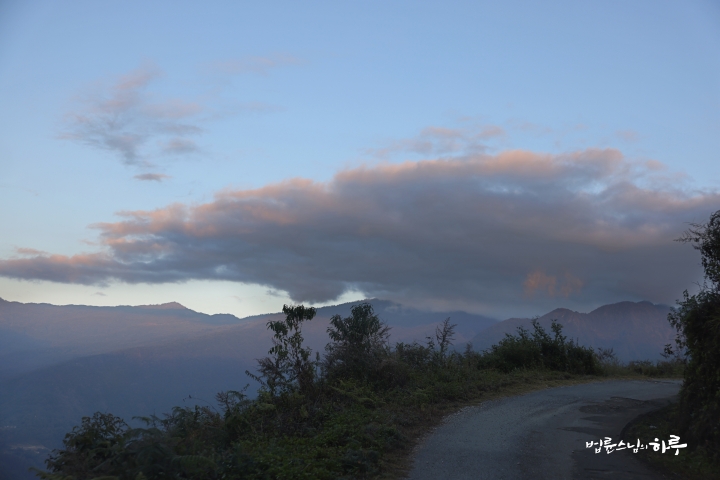
For example, if you confess your feelings to someone you like, whether a woman or a man, and you suffer because they reject you, that’s greed. It means you expect the other person to like you just because you like them. It’s greedy to confess your love without asking the other person first and then think, ‘How can you not accept me?’ unilaterally. If you confess your feelings and the other person says no, a person without greed would think, ‘Okay, no matter how much I like them, if they don’t like me, there’s nothing I can do,’ and let it go. Or, they might think, ‘Before, I didn’t know if they liked me or not, but now I know they don’t like me. So, what efforts can I make to get this person to like me?’ and start researching. Instead of considering it a failure when the other person says no, you should research how to make someone who doesn’t like you start liking you, now that you’ve confirmed they don’t. To do this, you need to ask people around them and the person themselves what they like, and then do something that might appeal to them. This way, you won’t feel discouraged, hurt, or defeated by this issue. You feel defeated not because things didn’t work out, but because you were greedy.
You’re thinking, ‘If I pass the exam, I’ll definitely get promoted.’ But from the company’s perspective, those who pass the exam have just met the basic qualifications for promotion. Who they actually promote is decided from a different perspective. It seems you’re thinking that passing the exam automatically means promotion. Try to understand how your company works. It’s not always like that. For example, if 10 people pass the exam, the company might choose 3 out of those 10 for promotion. Then, if 5 more people pass the next exam, now there are 12 candidates for promotion, including the 7 who passed earlier. When they decide to promote 5 people out of these 12, there’s no rule saying they must promote those who passed first before those who passed later. You’re expecting automatic promotion just because you passed, which is why your expectations don’t match the results.
In your case, the best solution might be to fail the exam. Then you won’t have to worry about any of this. Just take the exam half-heartedly each year and fail. If you repeat this, you’ll stop expecting promotion, and the exam will become irrelevant to you. Isn’t it better to pass once and then wait, rather than failing five times and passing on the sixth try? Which is better: passing on the first try and waiting six years for promotion, or failing five times and getting promoted after passing on the sixth try?”
“Neither option is appealing because I don’t want to take the exam every year.”
“If you had to choose one of the two, which would you pick?”
“I think it would be better to approach this by understanding what the company wants, as you suggested.”
“Companies have a structure where they appoint people they deem suitable from among those who have met the qualifications. If you’ve passed the exam and qualified, but the company hasn’t appointed you, it could be because you’ve been a bit rigid in your behavior towards superiors or haven’t shown any particularly notable achievements. I’m not suggesting you lobby for promotion. When you’re having meals or drinks with your superiors, casually ask about the selection criteria during conversation. You might learn that you need to prepare certain documents well or give good briefings. Once you know this and see the final selection results, you’ll understand what kind of people your company selects. Then you can either adjust your behavior to fit these selection criteria or decide, ‘Do I really need to go that far for a promotion? I’m fine just steadily receiving my salary,’ and settle your stance that way.
For example, if you get promoted quickly but get stuck in the position just below director without being able to move up, there’s a high chance you’ll be let go. These days, the salary difference between positions isn’t as significant as it used to be. So, wouldn’t it be better to move up slowly? If I were you, I’d actually ask for others to be promoted first. If the president says, ‘Shouldn’t you be promoted this time?’ you could respond like this:
‘Thank you, but there’s a younger colleague in our team with two children. It would be great if they could be promoted first. I’m doing fine and I’m willing to move up slowly.’
Wouldn’t your work life be more comfortable with this kind of attitude? If a company really needs someone, they’ll promote them even if that person says they don’t want it. If they don’t need someone, they won’t promote them even if that person asks for it. But you seem to think that if you want a promotion, they should give it to you, and if you don’t want it, they shouldn’t. You’re mistakenly thinking that you have the authority to decide on promotions. Promotions are selected by the president based on their own criteria. If you want to be promoted, you should either figure out those criteria and meet them, or choose to live with the mindset of ‘Let others go up first, I’ll move up slowly.’ If you just worry about it, you’re only hurting yourself.
Also, if you’ve lived in Pohang for 6 years after moving from Busan, you could ask your wife and children, ‘I’m really satisfied living in Pohang. How about you?’ They might answer, ‘If you’re satisfied, we’re fine too,’ or they might say, ‘We really can’t live here anymore.’ After hearing their opinions, if your family says they really can’t live there, it might be better to return to where you used to live, even if it means a lower salary. But if they say, ‘We have some complaints, but since you like it here, we’ll stay,’ then you can say ‘I’m sorry’ and provide some other services to your family.
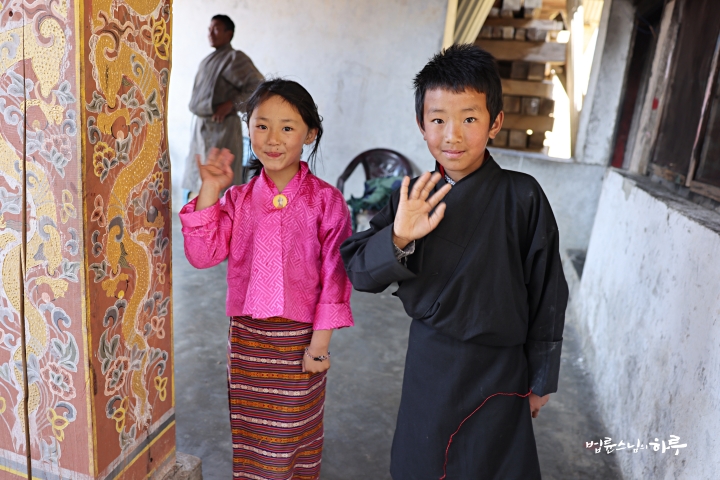
Above all, I hope you don’t think about providing the best living conditions for your family. That’s also greed. What is the best standard of living? Is it increasing the size of your house? It’s not. It’s best to live within your budget, and more importantly, to listen to your family, especially your wife. What families want is for you to engage in conversations, spend time together, help with the dishes – not to bring home a lot of money. Korean men still haven’t figured this out. It’s a big misconception to think, ‘If I just earn a lot of money and bring it home, my family will be satisfied.’ When I talk to women, although they do like it when men earn good money, it’s not their top priority. More than that, they want to share conversations and daily life together. So, please don’t feel too burdened by being the breadwinner.”
“Sunim, I think hearing your words will be a turning point for a big change in my life. Thank you.”




